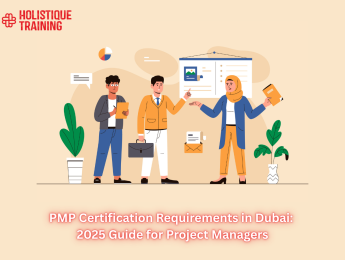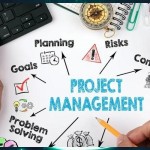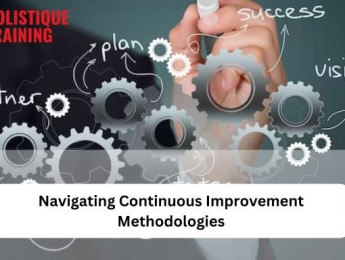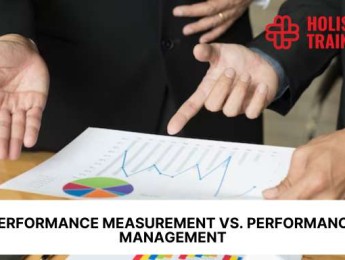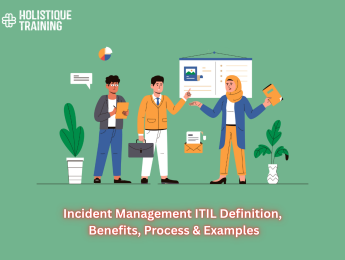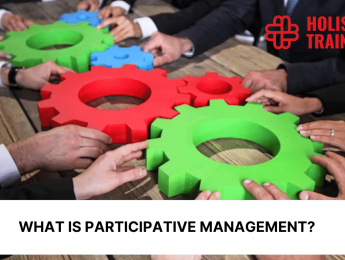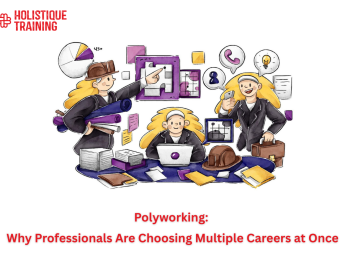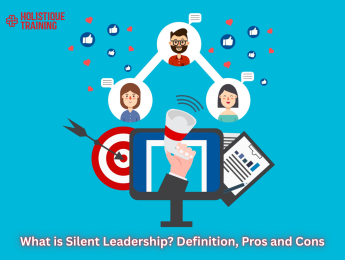- Table of Contents
- 1. Introduction: Why PMP Matters in Dubai’s Job Market
- 2. Overview of PMP Certification
- Global Benefits of PMP Certification
- PMBOK® Guide (7th Edition) Framework
- 3. Who Needs a PMP in Dubai?
- 4. PMP Certification Eligibility Requirements
- The 35 Contact Hours (Training)
- What Counts as Project Management Experience?
- Tips for Documenting Project Hours in the Application
- 5. PMP Application Process in Dubai
- Step-by-Step Application Process
- Testing Centres in Dubai
- Application Fees (USD & AED)
- PMI Membership Benefits & UAE Local Chapter
- 6. PMP Exam Format, Content, and Preparation
- Exam Format
- Exam Domains & Weightings
- Preparation Resources & Strategy
- Recommended Training Institutions & Local Options
- Study Plan Sample (8-10 Weeks for Working Professionals)
- 7. PMP Exam Costs and Renewal Fees in Dubai
- Cost Breakdown
- Currency, Payment Methods & Local Considerations
- Continuing Certification Requirements (CCR)
- 8. Top PMP Training Providers in Dubai
- 1. Holistique Training
- 2. PwC’s Academy Middle East
- 3. Informa Connect Dubai / Informa Middle East
- 4. Learners Point
- 5. Sprintzeal
- Additional Providers Worth Checking
- What to Look for in a Training Provider
- 9. Career Benefits of PMP Certification in Dubai
- Salary Insights
- Promotion & Leadership Opportunities
- Real-world Case Study (Hypothetical Composite)
- Recognition Across GCC
- Reflections on UAE’s Leadership & Digital Transformation Trends
- 10. Common Challenges and Tips for Success
- Challenges
- Tips for Success
- 11. Conclusion
1. Introduction: Why PMP Matters in Dubai’s Job Market
In today’s competitive global economy, credentials matter and few project management credentials rival the Project Management Professional (PMP) certification in terms of prestige, rigor, and recognition. Awarded by the Project Management Institute (PMI), PMP is widely acknowledged as the gold standard in project management certification, signifying that holders have mastered globally accepted project management principles, methodologies, and best practices.
In rapidly growing markets, where infrastructure, technology, and services projects dominate, PMP certification often serves as a differentiator between competent managers and elite professionals. Dubai, in particular, has emerged as a regional hub for innovation, construction, and digital transformation — and with that comes intense demand for certified project managers.
The United Arab Emirates (UAE) has ambitious development goals under its national vision plans. While “Vision 2021” has already steered significant change, the upcoming strategies toward 2030 and even 2040 emphasize sustainable urban development, renewable energy, infrastructure expansion (roads, airports, rail systems), digital, smart cities, and large-scale tourism and hospitality projects. These huge initiatives require rigorous project governance, streamlined stakeholder management, and risk mitigation — all skillsets that PMP certified managers bring to the table.
Given the scale and complexity of public and private projects in Dubai — from iconic real-estate towers and airports to ICT systems and infrastructure — certified project management professionals are in high demand across sectors like construction, information technology, logistics and supply chain, finance, government services, and energy & utilities. Employers want assurance that someone can successfully deliver projects on time, within budget, and aligned with strategic objectives.
Hence, for any ambitious project manager working in or relocating to Dubai, understanding the PMP certification requirements in Dubai is not just academic — it’s a strategic career move. This guide delves into everything you need to know in 2025 — from eligibility and costs to training and exam strategies — so you can confidently chart your path toward PMP and elevate your professional standing in the UAE market.
2. Overview of PMP Certification
The Project Management Professional (PMP) certification is governed and awarded by the Project Management Institute (PMI), based in the United States. PMI is a globally recognized nonprofit professional membership association for project management professionals, and it establishes standards, publishes the PMBOK® Guide (Project Management Body of Knowledge), and administers globally recognized certifications (PMP, CAPM, PgMP, etc.).
Global Benefits of PMP Certification
- Increased salary potential: PMP-certified professionals typically command higher wages compared to non-certified counterparts. According to industry salary surveys, PMP holders often earn 20–25% more.
- Leadership credibility: Having a PMP signals to employers and clients that you abide by a rigorous standard of ethics, methodology, and project governance. It places you in a league with trained professionals who adhere to globally accepted approaches.
- Structured skillset: PMP training reinforces core skills in initiating, planning, executing, monitoring & controlling, and closing projects, along with risk, stakeholder, quality, procurement, and integration management — all within predictive, agile, and hybrid methodologies.
- Global mobility: Because PMP is recognized worldwide, you can use it across geographies — including all GCC (Gulf Cooperation Council) countries. A PMP earned in India, the U.S., or Europe is equally valid in the UAE, Qatar, Saudi Arabia, Oman, or Kuwait.
By aligning yourself with PMI standards, you align your project vocabulary, metrics, and best practices with international peers and frameworks, which is especially valuable when working in multinational or cross-border project environments.
PMBOK® Guide (7th Edition) Framework
PMI’s current guiding publication is the PMBOK® Guide – 7th Edition, which represents a shift from process-oriented models toward principles-based thinking and performance domains. While prior editions emphasized process groups and knowledge areas, the 7th edition frames project management in terms of value delivery, performance domains, and systems thinking. It encourages flexibility in applying methodologies — agile, waterfall, or hybrid — depending on context. As part of the PMP exam content, foundational knowledge from earlier editions (e.g. predictive techniques, risk analysis, stakeholder management) is still relevant, and many training providers integrate both process-based and principle-based teachings.
In sum, PMP certification is much more than a credential. It is a commitment to continuous professionalism, a framework for disciplined project execution, and a passport to global project leadership. In a high-stakes environment like Dubai, where projects are large-scale and multifaceted, these advantages often tip the balance in favor of PMP-certified candidates.
3. Who Needs a PMP in Dubai?
Not every professional needs a PMP — but for many working in project-driven environments, it can be a game changer. The ideal audience for PMP includes:
- Project coordinators or junior project leads who seek advancement
- Engineers, architects, and construction professionals managing project deliverables
- IT managers, software leads, and technical architects working on large systems
- Consultants and business analysts who coordinate cross-functional teams
- Mid-level executives, program leads, or PMO staff aiming for formal accreditation
In Dubai, many prominent organizations — Emaar, DP World, ADNOC, DEWA, Emirates Group, Dubai Airports, and many government and semi-government entities — prefer or require PMP certification for project leadership roles. A quick scan of LinkedIn job listings in Dubai often reveals “PMP preferred” or “PMP required” in UX, infrastructure, digital transformation, and real estate project roles.
LinkedIn data suggests that candidates with PMP are more likely to get interviews and recruiter attention for project roles in the UAE region. Some survey data in GCC markets show PMP among the top three sought-after credentials in project or program management roles.
A typical career progression with PMP often looks like:
- Assistant Project Manager / Project Coordinator →
- Project Manager →
- Senior Project Manager / Program Manager →
- Director of Projects / PMO Head
With PMP backing, professionals often have more stability in large organizations, are eligible for cross-border roles (e.g., UAE ↔ GCC ↔ global), and are better positioned to lead high-value, complex projects.
In a city like Dubai — where the pace of development is intensive and competition for top roles is steep — having PMP on your CV signals seriousness, standardized capability, and commitment to project excellence. For those already in project roles, obtaining PMP often becomes a career turning point.
4. PMP Certification Eligibility Requirements
The PMP eligibility criteria are established by PMI and are the same worldwide — but it is important to interpret them in Dubai’s local context (e.g. training in AED, local course providers, documentation). Below is a breakdown.
Requirement Category | Option 1 (With 4-Year Degree) | Option 2 (Without 4-Year Degree) |
Education Level | Bachelor’s degree or equivalent | Secondary degree (high school diploma, associate degree) |
Project Management Experience | 36 months (minimum 3 years) leading and directing projects | 60 months (minimum 5 years) leading and directing projects |
Leading Project Hours | 4,500 hours leading and directing | 7,500 hours leading and directing |
Project Management Education | 35 contact hours (or CAPM certification) | 35 contact hours (or CAPM certification) |
These requirements are confirmed by PMI’s own published prerequisites.
The 35 Contact Hours (Training)
To satisfy the “Project Management Education” requirement, you must complete 35 contact hours of formal project management instruction. Many PMI-authorized or Registered Education Providers (REPs) in Dubai offer courses to fulfill this requirement. Some examples: Zabeel Institute offers courses in Dubai that deliver the 35 contact hours needed. Vinsys’s UAE branch also emphasizes this requirement.
These training courses may be delivered in-person or live online (virtual). Prices in Dubai commonly range from AED 2,000 to AED 4,000 (or more, depending on provider, class duration, quality, and additional materials). Some training providers bundle mock exams, study guides, and support.
Below is a sample cost/delivery comparison:
Provider / Mode | In-Person / Live Online | Typical Duration | Approx. Cost (AED) |
Local institute (e.g. Zabeel, Holistique) | In-person or hybrid | 4–5 days / weekends | 2,500 – 4,000 |
Online / virtual instructor-led | Live online | 5 full days or spread over 2 weekends | 2,200 – 3,800 |
Self-paced / blended + live sessions | E-learning + occasional live session | Several weeks | 1,800 – 3,500 |
These are approximate ranges; always check provider credentials (PMI Authorized Training Partner / REPs) to ensure your contact hours are accepted by PMI.
What Counts as Project Management Experience?
When reporting your experience to PMI, the time must be non-overlapping and in distinct projects. Acceptable activities include:
- Leading or directing project tasks, phases, or entire projects
- Managing project scope, schedule, cost, quality, risks, stakeholders, resources
- Being accountable for deliverables, team performance, or outcomes
- Coordinating cross-functional teams or vendors
Tasks such as administrative work, repetitive operational tasks, or non-project contributions are typically not accepted. Document clearly your role, dates, hours spent, deliverables, and tools or techniques used.
Tips for Documenting Project Hours in the Application
- Be precise: Indicate start and end dates (month/year), role title, project name, hours spent, and key responsibilities.
- Use a spreadsheet: Create a clean log of each project with breakdowns per domain (scope, time, risk)
- Avoid overlap: If you work on two projects concurrently, do not double-count identical hours
- Keep evidence: Maintain project plans, emails, performance reviews, and supervisor confirmations in case you get audited
- Align with PMP terminology: Use PMI-style terminology (e.g. “manage stakeholder engagement,” “control schedule”) — so PMI reviewers immediately recognize your experience
Meeting these documentation standards helps your application succeed and reduces the risk of audit complications.
5. PMP Application Process in Dubai
Once you meet eligibility, the application process to get PMP certified is a multi-step but straightforward path. Here is how it works, from a Dubai perspective.
Step-by-Step Application Process
- Create a PMI.org account
If you don’t already have a PMI member account, register on PMI.org (you may choose to become a PMI member before applying, to benefit from discounted exam fees and member resources). - Complete the PMP application form
Log in and fill out the online application. You will need to specify your educational background, professional project experience (dates, roles, hours, and description), and 35 contact hours training details. - Application review and approval
PMI reviews your information (typically 5–10 business days). They may accept it, reject it (if details are missing), or flag it for audit. - If audited
Provide supporting documentation — transcripts, training certificates, project logs — within the given timeframe. Once audit passes, you move to scheduling the exam. - Schedule the PMP exam
You can schedule via Pearson VUE test centres in Dubai or opt for PMI’s online proctored exam (if you qualify). Select the date, time, and location (or online).
Testing Centres in Dubai
Dubai hosts several Pearson VUE test centers in business districts and educational hubs. Some common locations:
- Knowledge Park / Dubai Internet City
- Jebel Ali Free Zone (JAFZA)
- Dubai Academic City
- Downtown / Business Bay
- Dubai Silicon Oasis / Science Park
(For the specific centers, always check Pearson VUE’s Dubai listings during scheduling.)
Application Fees (USD & AED)
According to recent data, the application cost is:
- PMI Member: USD 405 (approx. AED 1,485)
- Non-Member: USD 555 (approx. AED 2,035)
Note: If you are not a PMI member and then join PMI (membership costs ~USD 129 + USD 10 application), you may recoup part of the difference via discounted exam fees.
PMI Membership Benefits & UAE Local Chapter
As a Dubai resident, joining PMI UAE Chapter provides network access, local workshops, and PDU-earning opportunities (e.g. volunteering, webinars). The chapter charges a modest annual fee and helps local professionals engage with project management culture in UAE.
Benefits of PMI membership include reduced exam fees, discounted training and materials, access to digital resources/journals, and eligibility for certain PMI roles.
6. PMP Exam Format, Content, and Preparation
Once your application is approved and exam scheduled, it’s essential to understand the format, content, and how to prepare effectively within a Dubai context.
Exam Format
- 180 questions (reduced from the older 200-question format)
- 230 minutes total exam time
- The exam is computer-based, delivered at test centres or online proctored
- Question types include:
- Multiple-choice
- Multiple-response
- Drag-and-drop
- Matching
- Hotspot / graphical
- The exam may include some unscored (pretest) questions — they are not differentiated to you.
Exam Domains & Weightings
The PMP exam is organized into three domains:
- People (≈ 42%)
Focus on leadership, team building, conflict resolution, stakeholder management, coaching, team motivation, and negotiation. - Process (≈ 50%)
The bulk of technical project management: planning, executing, monitoring & controlling, domain-specific practices (scope, schedule, cost, risk, procurement, quality). - Business Environment (≈ 8%)
Covers how projects align with strategy, compliance, organizational change, value delivery, and external environmental factors.
These domains reflect both predictive and agile/hybrid methodologies; PMI expects candidates to be comfortable working in adaptive environments.
Preparation Resources & Strategy
- PMBOK® Guide (7th edition): the foundational reference
- Agile Practice Guide: because the exam includes agile/hybrid content
- Authorized course materials: from your training provider (often includes slides, handouts, study guides)
- Simulators & mock exams: many providers give dozens to hundreds of realistic practice questions
- Study groups / peer coaching: joining Dubai-based PMP cohorts helps with accountability and local context
- Flashcards, quizzes, cheat sheets: to drill definitions and formulas
Recommended Training Institutions & Local Options
Many training providers in Dubai run PMP exam prep aligned with PMI standards. Some include Zabeel Institute, Holistique Training, PwC’s Academy Middle East, Sprintzeal, and others. For example, Sprintzeal offers a 35-contact-hour course in Dubai with ATP-status and bundled mock exams.
Providers may offer in-person boot camps (4–5 full days) or spread-out weekend batches or live-online formats. Ensure they are PMI Authorized Training Partners or reputable REPs so your 35 contact hours are accepted.
Study Plan Sample (8-10 Weeks for Working Professionals)
Below is a suggested roadmap to balance a full-time job and exam prep:
Week | Focus | Activities |
1 | Understand exam blueprint | Read PMP exam specification; map domains |
2 | People domain deep dive | Study leadership, team, stakeholder topics; 100 questions |
3 | Process domain – plan & scope | Focus on planning, scope, cost; 150 Qs |
4 | Process domain – schedule & risk | Schedule techniques, risk, estimates; 150 Qs |
5 | Process domain – quality, procurement, integration | 100–150 Qs |
6 | Business environment + agile/hybrid | Study alignment, compliance, agile methods |
7 | Mock exams & review weak topics | Take full-length mocks; analyze mistakes |
8
| Final review & exam preparedness | Flashcards, summaries, light mock exam, rest day |
9 (optional buffer) | Extra practice or repeat weak domains | |
10 (exam week) | Light review only | Rest, review cheat sheet, exam readiness |
Dedicating 10–15 hours per week is common for busy professionals. Adjust to your pace and strengthen weak domains.
7. PMP Exam Costs and Renewal Fees in Dubai
Understanding the full cost picture is critical for planning your certification investment in Dubai.
Cost Breakdown
Expense | PMI Member | Non-Member |
PMP Application / Exam | USD 405 (~AED 1,485) | USD 555 (~AED 2,035) |
Training Course | AED 2,000–4,000 (varies by provider) | AED 2,000–4,000 |
Renewal (every 3 years) | USD 60 (~AED 220) | USD 150 (~AED 550) |
As noted earlier, many UAE training providers’ tuition for 35 contact hours falls in the AED 2,000–4,000 range, sometimes inclusive of study material and practice exams.
Currency, Payment Methods & Local Considerations
- Payments to PMI are in USD, and local banks or credit cards will convert.
- Most Dubai training centers accept payment in AED or via online card transfer.
- If you pay for training first and then fail to get application approval, most providers allow rescheduling or refund per policy.
Continuing Certification Requirements (CCR)
To maintain your PMP credential, you must earn 60 Professional Development Units (PDUs) every 3 years. PDUs are earned through:
- Education: webinars, courses, conferences, workshops
- Giving Back: volunteering, creating content, professional work in project management
- Organizational contributions: presenting or mentoring
- Local chapter engagement: attending PMI UAE Chapter events
Dubai offers many PDU-earning opportunities via local workshops, PMI UAE Chapter events, seminars in training institutes, and webinars. Some providers allow you to bundle future PDU credits.
If you fail to renew on time, your PMP status may become suspended; after a grace period, you might need to retake the exam.
8. Top PMP Training Providers in Dubai
Choosing the right training provider is crucial — not only for passing your exam, but for getting relevant local context. Below are reputable options in Dubai and UAE, with key features to compare.
1. Holistique Training
- Focus: Practice-based simulations, real-world case studies.
- Mode: In-person or blended.
- Duration: Typically 5 full days or weekend batches.
- PDUs: Provides 35 contact hours accepted by PMI.
- Highlights: Local presence, customized support for UAE professionals (though less publicly documented online).
2. PwC’s Academy Middle East
- Focus: High-end corporate training, recognized brand.
- Mode: In-person / live online.
- Duration: Intensive workshops covering full PMP syllabus.
- PDUs: Awards 35+ contact hours.
- Eligibility: Open to professionals meeting PMI requirements.
- Credibility: Strong reputation and alignment with corporate standards.
3. Informa Connect Dubai / Informa Middle East
- Focus: Executive bootcamps and training events.
- Mode: Short-duration intensive courses.
- Duration: Typically 3–5 days.
- PDUs: Provides full contact hours required.
- Review: Often used by mid-career managers who prefer condensed formats.
4. Learners Point
- Focus: Flexible batches (weekends or evenings) for working professionals.
- Mode: In-person or hybrid.
- Duration: Spread across weekends or evenings over 4–6 weeks.
- PDUs: 35 contact hours certificate on completion.
- Value: Good option for professionals with time constraints.
5. Sprintzeal
- Focus: Global training provider with a presence in Dubai.
- Mode: In-person, live-online, self-paced options.
- Duration: 4-day classroom or spread-out schedules.
- PDUs: 35 contact hours, with mock questions and materials.
- Highlights: ATP status, robust support, practice exam access.
Additional Providers Worth Checking
- Zabeel Institute (UAE) — offers PMP courses, particularly in Dubai/Abu Dhabi.
- Vinsys UAE — specialized in PMP training in the UAE.
- ExcelR — offers PMP training in Dubai with practice tests and PMI-aligned syllabus.
- RedLearning (Dubai) — offers a KHDA-approved prep course delivering 35 contact hours.
What to Look for in a Training Provider
- PMI Authorization or REP: Ensures the 35 contact hours are accepted by PMI
- Instructor credentials: Trainers who are PMP-certified and experienced in UAE projects
- Mock exams / simulators: A rich bank of realistic practice questions
- Flexibility: Weekend, evening, or hybrid delivery to suit your schedule
- Post-training support: Q&A sessions, study materials, access beyond training
- Success / pass rate: Testimonials or statistics about first-time pass success
Choosing the right provider (especially one that aligns with your learning style and schedule) is nearly as important as doing the study itself.
9. Career Benefits of PMP Certification in Dubai
Beyond passing the exam, what real, long-term career benefits does PMP bring in Dubai?
Salary Insights
In the UAE, PMP-certified professionals typically fall into higher-paying brackets. For instance:
- According to PayScale , PMP holders in the UAE may earn around AED 240,000 annually (~AED 20,000/month) on average.
- GulfTalent reports average project manager salaries in the UAE in the range AED 18,000 to AED 37,500/month, depending on sector and seniority.
- Some local reports indicate project managers in Dubai earn approximately AED 21,875/month for those with PMP and strong experience.
Salaries depend heavily on your domain (construction, IT, oil & gas), years of experience, company size, and whether you hold multiple certifications (PMP + Agile, for instance).
Promotion & Leadership Opportunities
PMP certification gives you visibility and credibility that often opens doors to leadership roles, such as Senior Project Manager, Program Manager, or Head of PMO. Organizations in Dubai and across the GCC tend to fast-track certified professionals into management tracks because they trust their knowledge of governance, stakeholder management, and risk control.
Real-world Case Study (Hypothetical Composite)
Consider “Fatima,” an IT project manager in Dubai whose company was implementing a smart city solution. Though she had solid experience, her prospects for the role of Program Lead were limited without formal credentials. After obtaining PMP, she led the integration of multiple systems across Dubai’s infrastructure projects, gained the title of Program Manager, and saw a 30% salary hike.
Similarly, in the construction sector, engineers who acquire PMP often transition from technical lead roles into project management for large-scale infrastructure or mega-projects (e.g., airport terminals, high-rise complexes). Their combination of domain expertise and PMP legitimacy becomes highly valued.
Recognition Across GCC
One major advantage of PMP is regional mobility. A PMP earned in Dubai is recognized in Saudi Arabia, Qatar, Oman, Bahrain, and Kuwait. This is particularly valuable for professionals who may rotate across GCC projects or seek roles in neighboring countries.
In markets like Saudi Arabia, where giga-projects (NEOM, Red Sea developments) are underway, PMP-certified professionals are in demand. Thus, your investment in PMP in Dubai pays off regionally.
Reflections on UAE’s Leadership & Digital Transformation Trends
Dubai’s push toward smart cities, blockchain government applications, AI-driven services, and sustainable development demands disciplined project execution, robust change management, and strategic alignment — all hallmarks of PMP methodology. Possessing PMP makes you a suitable candidate to lead digital, infrastructure, or cross-functional change programs in UAE’s evolving landscape.
In short, PMP certification in Dubai can shift your career trajectory from executing tasks to owning strategic, high-impact initiatives.
10. Common Challenges and Tips for Success
Even motivated professionals face hurdles on the path to PMP. Here are some common challenges and how to overcome them:
Challenges
- Time management with a full-time job
Many applicants struggle to balance work, training, and self-study. - Cost of training and exam
The upfront investment in training and exam fees can deter some. - Exam anxiety and complexity
The exam is broad and can feel intimidating, especially when juggling different question types. - Documenting experience accurately
Applicants sometimes under- or overstate hours; PMI may reject unclear entries or trigger audit. - Maintaining discipline over a multi-week study plan
Without accountability, many lag behind.
Tips for Success
- Set a fixed weekly schedule
Block 10–15 hours per week (e.g. evenings, weekend mornings) dedicated to PMP study. - Join local study groups or online cohorts
Dubai often has PMP boot camps, meetups, or LinkedIn groups — collaborating helps keep momentum. - Use high-quality simulators and timed mocks
Simulate real exam conditions; measure your speed and accuracy under timed settings. - Focus on weak domains early
Use initial mocks to identify weaker areas (e.g. agile, business environment) and allocate extra time. - Take short breaks and do active revision
Use flashcards, summary sheets, and teach-back methods (explain concepts to others) to solidify memory. - Stay updated on exam changes
PMI occasionally updates exam content outline; always refer to official sources just before your exam. - Leverage PMI UAE Chapter & local workshops
Attend webinars, local PDU sessions, and networking events to deepen understanding and motivation. - Monitor your progress and adjust
If a domain proves weak, adjust week-by-week plans; don’t rigidly stick to an outdated schedule.
With perseverance, structured study, and the right resources, many candidates clear the PMP on their first attempt.
11. Conclusion
Earning your PMP certification while in Dubai not only elevates your credentials but also positions you as a trusted leader capable of delivering complex, strategic projects in one of the world’s fastest-developing markets. The demand for rigorous project governance, stakeholder alignment, risk mitigation, and value delivery is only increasing across Dubai’s infrastructure, digital transformation, and sustainability initiatives.
By reviewing and fulfilling the eligibility requirements, selecting a credible training provider, applying through PMI, and following a disciplined preparation roadmap, you can secure PMP certification and unlock higher salaries, leadership roles, and regional mobility. Moreover, investing in your professional growth signals to current and future employers that you are committed to excellence.


